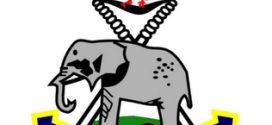Over the years, the common trend was for any interested group of Ekiti indigenes home and abroad to constitute various rallying points to serve kinsmen within those constituencies while a few others were established to serve narrow interests as evident in their activities and priorities. With the advent of technology that has turned the whole wide world into a global village, Ekitipanupo initiative evolved. The first and foremost Ekiti all peoples’ congress that will accommodate under one roof as many rational indigenes as possible irrespective of their political leanings or preferences was in the radar of the vision.
Essentially, there was need for an all-inclusive forum outside the government that can boldly step out to speak for Ekiti people on any national issue and matter of common heritage without being seen as sectional or self-serving. This is the commission of Ekitipanupo initiative with every sense of responsibility and all humility. Beyond having a microcosm of Ekiti State in an interactive forum setting, the platform was not set-up to be apolitical.
Thus, Ekitipanupo members cannot be watching untoward things happen in their homestead or within the nation and won’t be able to intervene to facilitate rescuing arising embarrassing socio-political situations. Consequently, Ekitipanupo is with intent and purposes primarily an indigenous intellectual roundtable strategically structured to constitute a ‘think-tank’ for the good of Ekiti and by extension to the larger society, Nigeria. The vision is to drive a mission that will evolve core leadership options capable of instigating thoughts and structure that will build crop of committed indigenes who will serve with accountability and responsibility in Ekiti State of Nigeria.
Ekitipanupo as a Special Purpose Vehicle (SPV) formally took off on March 6, 2005 as 4-phase project initiated to consummate a Collective Restructuring Strategy (CRS) for sustainable good governance in Ekiti-State. The need to convene a truly indigenous “think tank” that will be representative enough and attract as many sincere, selfless, non-sectional indigenes; with functional and logical divergent views as possible, informed the Ekitipanupo initiative. The forum therefore is a purpose driven intervention. The platform has on board non-politicians, politicians, technocrats, professionals of wide range. Membership spread across the three Senatorial districts and all the local governments are covered while over 95% of the major towns and villages in Ekiti-State have at least one son or daughter on board. In order to accommodate the views of the younger ones and students, a separate e-chat portal was put in place for the youth wing.
The group broke into four committees within months of take-off. Policy Development Committee was made-up of various technocrats who came up with a well appreciated Blue Print in 2010 for the state government. The policy review was commissioned to cover, revenue generation, investments, industrialization, agriculture, town planning, health sector, education, judiciary, utilities etc.
Grass-root Awareness Committee was charged to come up with cost effective ways to get the principle of Ekitipanupo across to the people that will make transformation easier on a lasting basis. This makes an Ekitipanupo tabloid to be very relevant for measured information dissemination.
The Political Action Committee developed a guideline on how to run the affairs of the SPV as a socio-political group for all goodhearted indigenes such that there would be no allegiance to any individual or political party but to good governance and as the need arises, endorse visibly reliable political candidates and tested hands for elective posts. Also the committee defined the criteria for political aspirants and the mode of supporting the accredited candidates that have succeeded in winning the mandate of their political parties. The Finance Committee was charged with the responsibility of coming up with a funding modality for identified projects and advise on the appropriate fees for the financial membership of the group (owo ni keke ihinrere!).
While every benevolent indigene irrespective of location and calling is free to be actively involved in the 1st, 2nd and the 4th phase by way of intellectual inputs, moral support and association; it is those in government, politicians and indigenes on the ground in Nigeria and Ekiti in particular that would essentially be actively involved in the implementation phase. Obviously everybody cannot be president, governor, senator, state legislator or Councillor, yet one can associate with or identify, recommend and encourage people that have flare for leg work and indigenes that are disposed to communal service through credible antecedents to take mantle of leadership such that everyone would take credit. Nobody changes the City Hall from outside. The right calibre of people must be involved in the governance of the people at all levels to effect the desired changes and of course the need to walk the talk is equally important.
In the final analysis, after the desired structure has been collectively instituted, we have succeeded in having one-big indigenous family (agbo-ule) of facilitators of positive changes that have resolved to touch base with each other online real-time and all the year round. On an enduring note, members share thoughts, low and high moments in the conventional Ekiti tradition without fear of favour or patronage.
In essence, as a credible group, Ekitipanupo is poised to commend good deeds of government and rebuke when such administration is off course. Thus, through periodic feed backs we have been able to develop a strong bond within the agbo-ule such that the progresses recorded by successive governments in the state are being monitored without undue interference. Also in a conducive state of affairs, suggestions, recommendations based on the arising realities on the ground have been passed as a group or individually to every government of the day as a going concern whenever the political terrain is friendly.
It would be interesting to bring into perspective the fact that for many years, Afenifere was meeting without representatives from some senatorial districts or local governments and many of the towns for that matter, yet they will come out with a communiqué
supposedly binding on Yoruba, Ekiti inclusive of course. Also for a very long time, this same conclave of a small clique, kudos to them albeit for their good initiative, has been dictating political direction of Yoruba nation over the years until recently. Likewise, Yoruba Council of Elders (YCE) is carrying on with its agenda, as well as Arewa, Ohaneze and several others also in this category. A true Ekiti people’s indigenous socio-political group like Ekitipanupo was long overdue.
To a reasonable extent we have been able to grow Ekitipanupo to a predominantly acceptable group that has earned the respect of all and sundry well-meaning Ekiti people through the deeds of the indigenous intellectual roundtable. Those who direct the state of affairs of government through political parties are often a small clique most especially in the Nigerian democratic setting whereby true voting is yet to really count satisfactorily.
The challenge before us therefore is how we go about ensuring that the election goes the way of the majority. Until then, one easy way out is for trustworthy indigenes to come together and harmonize their thoughts to promote Ekitipanupo such that we can sustain a lasting CRS for the good of Ekiti.
Any initiative set to address CRS in Ekiti-State which has started on the note of a wide geographical spread, multidimensional and unbiased approach is really working from the position of strength. This is one distinct attribute of Ekitipanupo which should be acknowledged and explored fully. Its open door deliberation strategy also put the preeminent forum over clandestine groups.
However, its inability to convene meetings whereby every member could be present particularly within the location where the desired transformation is actually required is indeed not a plus. This is why the 10th anniversary that has been scheduled for celebration on May 23rd 2015 at Ado-Ekiti, Ekitipanupo will use the opportunity to hold a national congress of its members.
Nevertheless, medium of interaction via internet can be seen from the perspective of strength. It gives the forum the benefit of having access to intellectual inputs at every point in time beyond the people resident in Nigeria. Internet may not necessarily be the ultimate but certainly it is a means to an end if deployed appropriately.
Ekitipanupo to the glory of God and service to mankind has been able to record so many milestones through internet meeting approach. To further mitigate the disadvantages of internet meeting, the group only needs to hold at least one annual get-together or conference that would be held in Ekiti such that as many members as possible can plan ahead of time and attend. The fact that people believe that there is room for improvements in the state of affairs and all hands should be on deck; it is indeed apt and just to have Ekitipanupo.
Ironically, the distinct way Ekitipanupo had been structured may not appeal to intrigue elements and anyone who is not inclined to open deliberations and transparency. Of course, light and darkness would never be friends.
Also those with personal agenda or narrow interest that often want to have their way at all cost and take advantage of or ride on a collective goodwill without recourse may not fit into the forum. In reality, people in this category may constitute a threat to the success of the initiative. They are often the ready tool of infiltration and the fifth columnists. Falsehood nor deceit doesn’t endure it is the truth that will prevail in the long run. Besides, for as long as the Ekitipanupo stays focused, stand by the truth and members make out time to lend their views to decisions taken or sincerely bare out their minds by way prompt responses to issues raised, challenges from these quarters are surmountable. The watch word should be how to make the Ekitipanupo work to achieve more and not negative prophecies. The sincerity of the progenitors is indeed a major prerequisite for a lasting Ekitipanupo.
The 10 years of Egbe Ekitipanupo is marked with a Public Lecture by Emeritus Professor Michael Omolewa and public presentation of Ekitipanupo Legacy Book (ELB) packaged by Seye Adetunmbi, the Conener of Egbe Ekitipanupo.. The book is titled EKITIPANUPO: Historical Excerpts and highlight of the Forum Deliberations between 2005 and 2015. Ekitipanupo initiative has grown to become an institution.
Consequently the book was put together essentially to capture the activities of the forum in one-stop pictorial book such that every literate Ekiti indigene would like to keep a copy of it because it is loaded with timeless material. It is in seven sections with the preface written by the Baba-Isale of Ekitipanupo, Chief SB Falegan. Part I tells the story of Ekitipanupo, the structure, framework for the forum activities, the revised constitution is also included and the synopsis of the accomplishments.
Part II was dedicated to the Blue Print made up of eleven chapters, for the development of Ekiti State which was presented to the State government in December 2010. This will enable every interested Ekiti person who gets a copy of the book to have access to the document. Also no political party that finds itself in government will complain of not having adequate intellectual support from Ekiti elite, it is a timeless document in the public domain.
The debut Ekitipanupo Public Lecture was discussed in part III. The rapporteur’s report and the papers presented were documented in this section. A set of well selected articles whereby multidimensional contemporary issues were discussed, depicting and complementing Ekitipanupo as a think tank and intellectual roundtable constituted the Part IV of the book.
From inception to date, the pictures of various events involving Ekitipanupo members were posted through internet to the forum members. The whole of section five was dedicated to the selected pictures of virtually all the notable events for the keeps of members and others who are not enlisted in the forum that get a copy of the book.
Extracts of dialogues that make Ekitipanupo an intellectual roundtable and think tank constituted Part VI of the book. The truth is that it would amaze members to know that most of the active contributors in the forum can actually package a book from their posts to the forum all these years. This maiden edition can only accommodate just a few for a start. Perhaps in future when Ekitipanupo publishes regularly a functional magazine, we will have more than enough material to use in the archive.
By virtue of the nature of the operations of Ekitipanupo forum, the platform is a school. Thus, the penultimate section covered the tutorial materials shared on the forum from time to time. It covered wide range of subjects from rustic Ekiti dialect words, to proverbs, English 101 and Ekitipanupo Business School. The last part featured integrated musings, Ekitipanupo Hall of Fame (EHF), tributes to our departed members and others who made EHF. Also published comments of members on what Ekiti meant to them were included in this section for posterity sake.
No doubt a lot of efforts went into the Ekitipanupo book which underscores the robustness of the platform for this kind of book to become a reality. We have to give it to the distinguished “Ekitipanupo parliamentarians”, without them there would have been no forum not to talk of writing a book on the forum.
This leads me to the political environment in Nigeria considering the fact that this book came out when national elections held in 2015. We continue to see many people jostling to contest for one position or the other in the manner of business as usual. How many of these candidates have really sat down to review the challenges ahead and prepare for it accordingly? Apparently, it is still the old way of doing things, “when we get to the bridge we will cross it”. The result of this attitude is evident in the state of nation whereby the majority are deprived in the midst of plenty.
Anyway, Nigerians, the elite in particular must not complain either at state or national level, post-general elections if they cannot work together from time to time as a group to effect the desired change in all the necessary political quarters. Instead, they would have to abide by whatever comes their way at the instance of their action or inaction because the polity indeed deserves the kind of leadership they get.
Those who desire something new, this is the time to identify with a relevant group and support it with every means at their disposal in all the respective constituencies.
Ekitipanupo has given an account of itself in the past 10 years as a going concern. The tiny historical and epoch seed “conceived” over 10 years ago was planted on March 6, 2005 and like a muster seed it has grown to become an institution beyond the imagination of the brain and thinking behind the initiative. It was one’s wish to ensure that virtually the interjection of every member featured but cannot be accommodated in this first edition. What has been presented in the ELB is a testimonial for every active member of the forum because the book showcases the best moments in the august forum, the shortcoming of the forum of mortals notwithstanding. It is a “must read book” for every literate Ekiti indigene and their friends. As a matter of fact, progressive minds from other states of the Nigerian federation that are desirable of an Ekitipanupo Forum Model (EFM), this book is recommended for them. To my beloved Ekitipanupo family, accept my hearty congratulations on the 10th year anniversary of the exemplary forum.
 Hottestgistnaija.com
Hottestgistnaija.com






